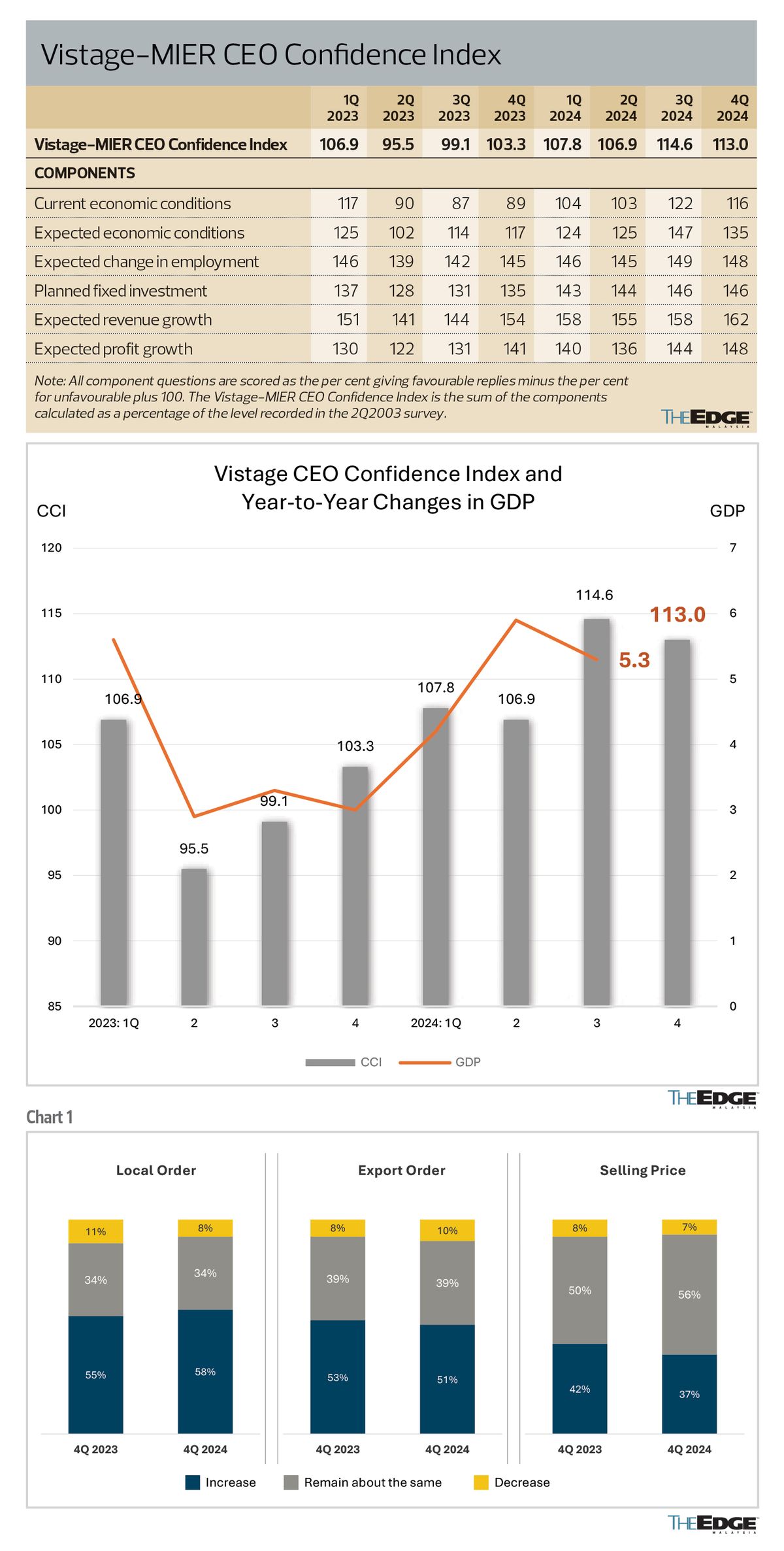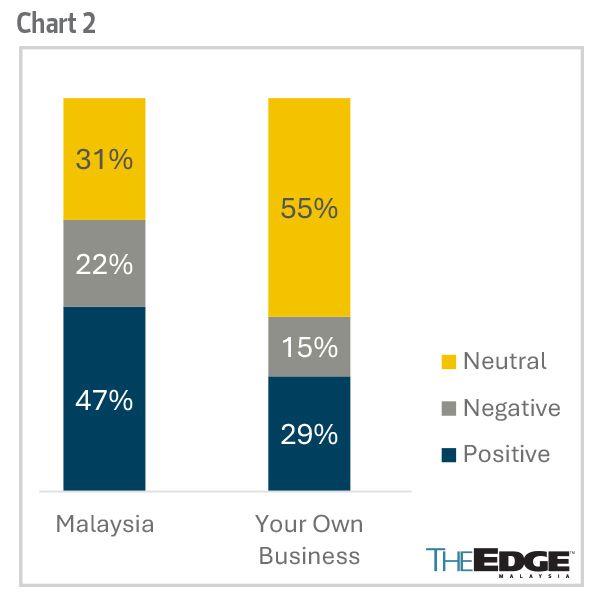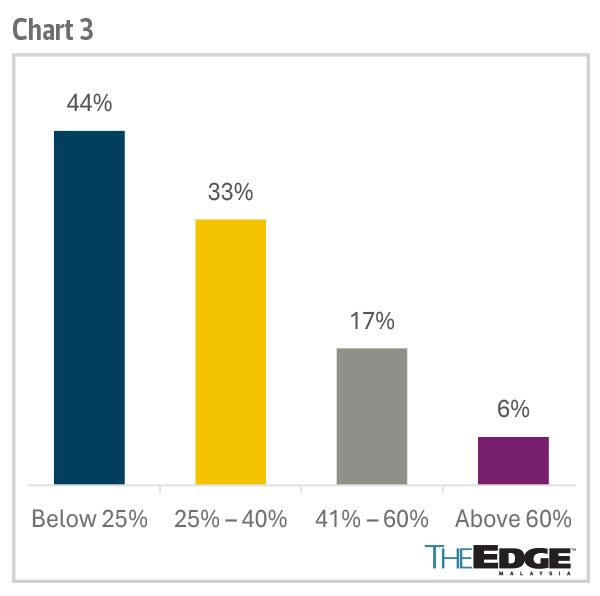
This article first appeared in The Edge Malaysia Weekly on January 13, 2025 - January 19, 2025
THE CEO Confidence Index shows steady growth over the past eight quarters, rising from 106.9 in 1Q2023 to a peak of 114.6 in 3Q2024 before settling at 113.0 in 4Q2024. In 2023, the index fluctuated due to global uncertainties and post-pandemic adjustments. But recovery gained traction in late 2023 and into 2024, driven by strong domestic consumption, government support and regional trade opportunities. However, the slight dip in 4Q2024 highlights ongoing concerns over rising interest rates, global economic headwinds and domestic policy uncertainties. Sustaining this positive trend will require structural reforms, innovation and workforce upskilling to maintain Malaysia’s competitiveness.
Key Highlights
The Current Economic Conditions Index for 4Q2024 declined to 116, down six points from the previous quarter’s 122 points but still higher than in 1Q2024 and 2Q2024. Among the 1,160 CEOs surveyed, 35% observed slow improvement, 46% expected no change and 19% anticipated worsening conditions.
The Expected Economic Conditions Index dropped to 135 from 147 in 3Q2024, reflecting cautious optimism. While 49% of CEOs foresee domestic economic improvements in the coming months, down from 57% previously, global uncertainties, inflation and high operating costs continue to temper business confidence despite gradual recovery signals.
In 4Q2024, the percentage of CEOs expecting their firm’s sales revenue to increase rose slightly to 68%, compared to 67% in 3Q2024. Those anticipating revenues to remain about the same saw a marginal rise from 25% to 26%, while the proportion of CEOs expecting a decrease dropped from 9% to 7%, indicating growing optimism among respondents.
Meanwhile, the Expected Profit Growth Index is relatively muted, but notwithstanding having to face persistent inflation and rising cost challenges, most CEOs remain optimistic enough of being able to at least sustain their profitability levels.
In 4Q2024, the Expected Change in Employment Index experienced a slight decrease, dropping by one point to 148. Despite this, 56% of CEOs expect employment to increase, indicating confidence in business growth. Meanwhile, 36% plan to maintain current staffing levels, while 7.8% are considering reductions, suggesting challenges in certain sectors.
Similarly, the Planned Fixed Investment Index remained steady at 146 points, reflecting consistent capital expenditure plans. Only 9.7% of CEOs are considering investment cuts, indicating a positive outlook for long-term growth despite external pressures.
Growth In orders and selling prices
Among the CEOs surveyed, nearly 57% anticipate an increase in both new local and export orders over the next six months. Meanwhile, 34% of CEOs expect local orders to remain unchanged and 35% expect export orders to remain unchanged. Regarding selling prices, almost 50% of CEOs believe they will remain the same, 44% expect them to increase and only 7% foresee a potential decrease (see Chart 1).
Workforce challenges and organisational preparedness
Strategies for improving recruitment and retention
In 3Q2024, the CEO Confidence Index Survey identified unattractive compensation, poor work environments and misaligned company values as major challenges in recruitment and retention. In the 4Q2024 survey, CEOs proposed actionable measures to addressthese issues.Key strategies include offering competitive salaries, performance-based incentives and hybrid work arrangements to attract talent.
Additionally, fostering a supportive workplace culture, aligning company values with employee expectations and investing in career growth opportunities are essential. Strengthening employer branding by showcasing success stories and promoting a positive work environment can further enhance recruitment and retention efforts.
Assessing cybersecurity training regularity in organisations
Some insights into cybersecurity practices reveal that many organisations do not prioritise regular employee training. The responses show that a large number of organisations do not have a set schedule for cybersecurity training. Among those who do, a small portion conduct training annually (14%), while even fewer offer it quarterly (5%) or biannually (4%). Only a small percentage provide monthly sessions (2%).
These findings suggest that while some organisations recognise the importance of cybersecurity training, the overall frequency remains limited, pointing to a potential area for improvement in fostering continuous employee awareness on cybersecurity threats.
Business outlook amid policy changes
Perceptions of higher import tariffs on Malaysia and business operation
The survey assessed the potential impact of higher import tariffs, such as those on China, under the second Trump administration. On a national level, a total of 78% of respondents expect either a positive or neutral impact for Malaysia, significantly outweighing the 21% who foresee a negative effect.Regarding their own businesses, 84%of respondents anticipate either a positive or neutral outcome, while only 15% predict a negativeimpact.
These results highlight that the combined positive and neutral responses (78% for Malaysia and 84% for businesses) far exceed the negative responses, suggesting a generally optimistic outlook regarding the potential tariff changes (see Chart 2).
Impact of minimum wage hike on businesses
The recent minimum wage hike in Budget 2025 is expected to increase operating costs while slightly raising disposable income for workers. According to the survey, 43% of businesses anticipate a slightly negative impact and 17% foresee a significantly negative effect. In contrast, 11% expect a positive impact, while 29% believe there will be noeffect on their operations.
These findings indicate that most businesses expect some level of negative impact, particularly in terms of rising costs, although a portion of businesses foresee no change. This highlights the need for companies to carefully manage operational adjustments in response to the wage increase.
Workplace wellness snapshot
Levels of employees mental stress
The survey sought to gauge perceptions of mental stress levels within organisations. The findings indicate that a large number of respondents (44%) believe only a relatively small segment of their workforce (25%) is experiencing significant mental stress, with a much smaller number of respondents (17%) flagging that mental stress issues are indeed much more pervasive throughout their staff population. While on balance, the findings on the presence of mental stress in members’ organisations are not particularly alarming, the importance of proactive mental health programmes and strategies to support and enable a healthier, more productive workforce cannot be overlooked (see Chart 3).
Health status of CEOs
As health is wealth, the survey aims to provide a scorecard on CEOs’ personal health. When asked to assess their current fitness and health levels, the top three health issues reported by most CEOs are being overweight, high cholesterol and mental stress. Notably, over the past three years (2022-2024), these three health issues have consistently ranked highest compared to other health conditions.
Key business updates: Compensation trends and AI think tank initiative
Salary increments and bonuses are expected to be leaner than last year. For the financial year ending Dec 31, 2024, most CEOs are considering salary increments of up to 5% and bonus payouts equivalent to one or two months’ salary for both managers and non-managers.
AI think tank proposal
Recognising the growing momentum around artificial intelligence (AI), Vistage proposed forming a member AI think tank to provide members with regular updates and insights into the evolving AI landscape. An overwhelming 95% of respondents expressed their support for this initiative, highlighting strong interest and enthusiasm for staying informed on AI developments.
Reflection on Vistage’s mission
Reflecting on Vistage’s mission of increasing the effectiveness and enhancing the lives of CEOs and their key executives, the majority of the CEOs responded positively. As in 4Q2024, in descending order of votes, most CEOs in 4Q2024 continued to attest to being better strategic thinkers, more effective leaders (including family/social relationship) and able to empower their people since joining Vistage.
Save by subscribing to us for your print and/or digital copy.
P/S: The Edge is also available on Apple's App Store and Android's Google Play.
- Intel CEO invested in hundreds of Chinese companies, some with military ties
- YNH Property's independent review reveals interconnected directors, shareholders in RM1.1b JV deals
- MSM sued by Ranhill over termination of effluent treatment plant project in Johor
- Perak eyes RM72b investments for Lumut Maritime Industrial City
- Chin Hin, HeiTech Padu, MyEG, MSM, Ranhill, Toyo Ventures, YNH Property
- LVMH finds making Louis Vuitton bags messy in Texas
- Trump’s manufacturing dreams clash with business owners’ reality
- Trump nods at ‘transition problems’ as White House clarifies China tariffs at 145%
- Sell-off accelerates on Wall Street, traders weigh risks as tariffs on China increased to 145%
- Anwar receives courtesy visit from tech giant Oracle, discusses AI and digital innovation




